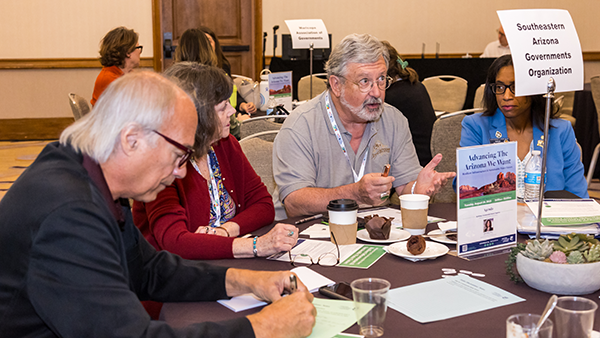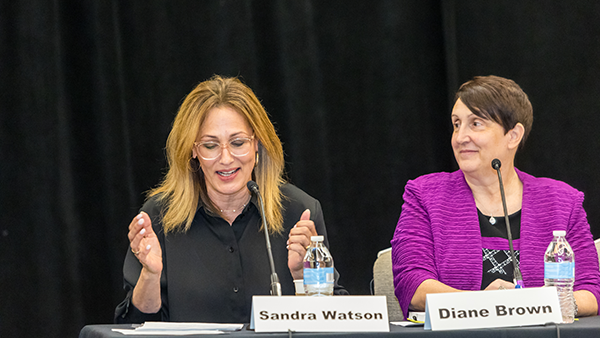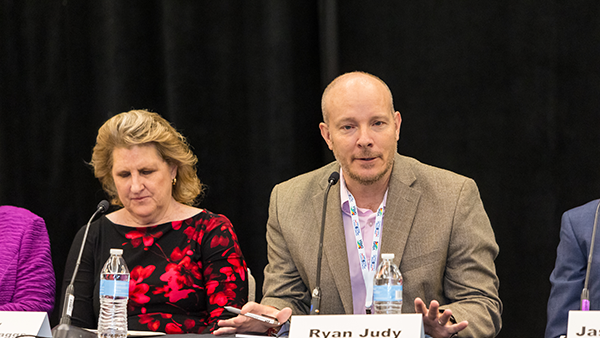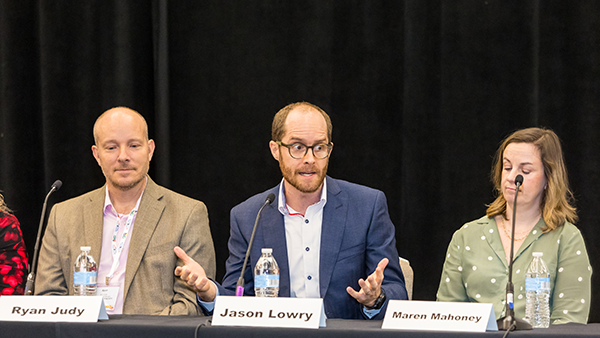Statewide Consensus Fuels Drive for Arizona Leaders to Forge a Sustainable Future
Strategies and resources to leverage available funding and advance Arizonans’ priorities spotlighted at annual conferencePhoenix has emerged from its hottest summer on record—and the state of Arizona from one of its warmest, as desert areas also received little relief from seasonal monsoon rain. The past few months offered a clear illustration of how challenging it can be for this state to build and maintain sustainable and resilient communities.
“...one of the Shared Public Values of our state’s residents is the desire to have “sustainable practices that protect our air, land, and water and support quality of life for all.”
But the results of Center for the Future of Arizona’s (CFA) Gallup Arizona Survey (which revealed The Arizona We Want) vividly displayed that one of the Shared Public Values of our state’s residents is the desire to have “sustainable practices that protect our air, land, and water and support quality of life for all.” And more specifically, 84 percent of those surveyed agreed that action is needed to reduce the heat island in urban areas and around the state, while 74 percent are in favor of Arizona making a transition to clean energy.
Recognizing the importance of sharing those areas of agreement, CFA welcomed some of Arizona’s most thoughtful business, government, and community leaders for a pre-conference session at the August 2023 League of Arizona Cities and Towns annual gathering in Tucson.
For seven years, CFA has organized this important gathering that offers valuable information to Arizona's municipal, county, tribal, and other leaders. The Pre-Conference Session aims to facilitate a collaborative effort in achieving The Arizona We Want, a shared vision of success based on what matters most to Arizonans. This vision is built on seven Shared Public Values that the broad and representative majority of Arizonans agree are essential to a prosperous future for all.
“Bisbee City Manager Stephen Pauken, who attended the session, believes consensus building is quite possible at the local level…perhaps even probable when facts and data are the centerpiece.”
Bisbee City Manager Stephen Pauken, who attended the session, believes consensus building is quite possible at the local level…perhaps even probable when facts and data are the centerpiece. He gave a strong endorsement of the information CFA is providing to communities and groups.
“I wish they could be in everyone’s living room to have a tabletop conversation about it,” Pauken said. “I think things would be a lot better in Arizona if it were.”

The panel on resilient infrastructure featured six participants—Sandra Watson of the Arizona Commerce Authority, Diane Brown of AZ PIRG, Jason Lowry of Local First Arizona, Maren Mahoney of Governor Katie Hobbs’ office, Stacey Brechler-Naggs from the city of Flagstaff, and Ryan Judy from the town of Prescott Valley.
“There’s a lot of money out there. To me, cash is green. It’s not red or blue. If it’s out there, we’re going to try to improve our community,” Judy continued. “These are our tax dollars that our residents are paying, and we want as much of that to come back to our community as possible. Because if not, it’s going to go to Chicago, L.A., New York. They’re going to take the money if we don’t.”
- Ryan Judy of Prescott Valley
All of the panelists agreed that a key component of improving infrastructure resilience and making communities more sustainable was taking advantage of federal grant money, which is increasingly available because of legislation like the Inflation Reduction Act. Ryan Judy of Prescott Valley was quick to point out to attendees that pursuing the funding was important, regardless of political leanings.
“There’s a lot of money out there. To me, cash is green. It’s not red or blue. If it’s out there, we’re going to try to improve our community,” Judy continued. “These are our tax dollars that our residents are paying, and we want as much of that to come back to our community as possible. Because if not, it’s going to go to Chicago, L.A., New York. They’re going to take the money if we don’t.”
Judy’s comments were especially helpful for attendees who may not have been aware of the amount of potential funding that is available. But the group CFA had assembled took that a step further by answering the question of how—as in ‘how does a community go about trying to obtain government money?’
Local First Arizona’s Jason Lowry described his organization’s Economic Recovery Center, which provides free grant writing support to rural towns and tribal entities that don’t have a grant writer on staff. Lowry said the center will go even further to help once a community receives a grant…
“How do we make sure that the municipality has the proper tracking and reporting metrics in place to ensure that, if you’re awarded that funding, one—you’re able to implement it and two—the federal government asks for a lot of reports. We want to make sure you’re in good standing as you’re implementing these projects and you’ve got everything in place to do that effectively to hopefully keep the door open for future funding opportunities as well,” Lowry said.
Lowry says the Economic Recovery Center has written grants that have generated more than thirty-three million dollars in funds in every county in the state.
“We saw Mohave Valley to Somerton got funding to pay for electric school buses,” Brown said. “Those help, not only with the indoor air quality for students that are riding the buses but for those breathing the air waiting to pick up a child or to drop off a child. They also have a great return on investment.”
- Diane Brown, Executive Director of the Arizona Public Interest Research Group
Diane Brown, Executive Director of the Arizona Public Interest Research Group, had high praise for CFA’s data and resources and encouraged attendees to utilize information related to The Arizona We Want. Like other panelists, Brown stressed the importance of seeking government grants but also mentioned colleges and universities as excellent options for collaboration. And she cited one of her favorite examples of a successful grant—one that would help younger students—a clean school bus program that is being utilized in northwestern and southwestern parts of the state.
“We saw Mohave Valley to Somerton got funding to pay for electric school buses,” Brown said. “Those help, not only with the indoor air quality for students that are riding the buses but for those breathing the air waiting to pick up a child or to drop off a child. They also have a great return on investment.”
By bringing together experts to address questions and concerns about resilient and sustainable communities at the League of Arizona Cities and Towns’ pre-conference session, CFA opened up a vault of data and information reflective of The Arizona We Want that show areas of broad support where Arizonans from every part of state want collective action to be taken.
It is clear that Arizona’s leaders understand a commitment to transforming ideas into action is pivotal as we work together to forge a path towards a resilient infrastructure and sustainable future for Arizona.
For CFA, the conversation doesn't end there. They are continuing to invite all leaders and communities to leverage this information, access available funding to advance projects, dive deeper into critical topics, and equip their communities with the knowledge and tools necessary to thrive.
Get involved and take the next step by visiting CFA’s resources page now.






